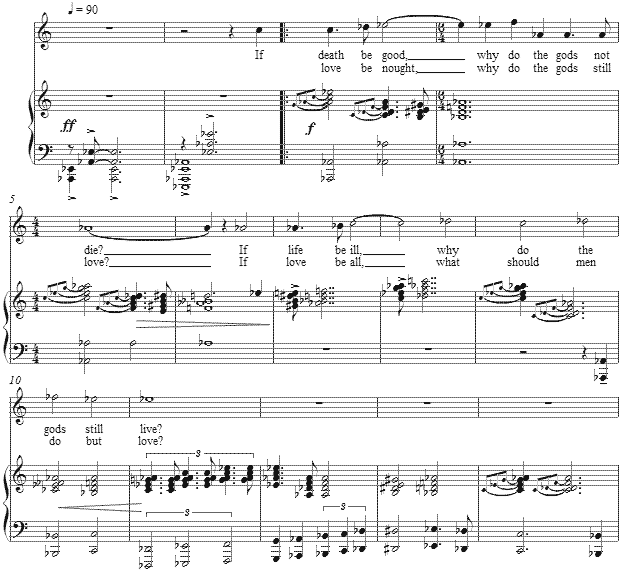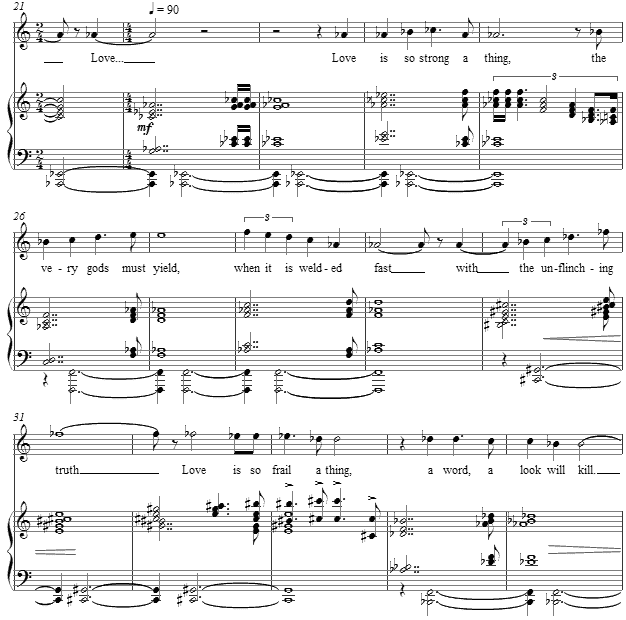Music and Texts of GARY BACHLUND
Vocal Music | Piano | Organ | Chamber Music | Orchestral | Articles and Commentary | Poems and Stories | Miscellany | FAQs
If Love Be All - (2009)
Bliss Carman
for medium or high voice and piano
If death be good,
Why do the gods not die?
If life be ill,
Why do the gods still live?
If love be naught,
Why do the gods still love?
If love be all,
What should men do but love?
Love is so strong a thing,
The very gods must yield,
When it is welded fast
With the unflinching truth.
Love is so frail a thing,
A word, a look, will kill.
Oh lovers, have a care
How ye do deal with love.[ 3 pages, circa 3' 30" ]
Bliss Carman
Born in Fredericton, New Brunswick, Canada, poet, editor and literary journalist Bliss Carman (1861-1929) studied at the University of New Brunswick and Harvard (1886-88), thereafter remaining in the United States after 1909 while continuing to work collecting Canadian poetry. He was corresponding member of the Royal Society of Canada and published over fifty volumes of poetry. Sappho: One Hundred Lyrics (Boston: L. C. Page, 1903) is an imagined volume of what the poetess Sappho may have accomplished.
As he wrote in the Introduction, "Fortunately for us, however, two small but incomparable odes and a few scintillating fragments have survived, quoted and handed down in the eulogies of critics and expositors. In these the wisest minds, the greatest poets, and the most inspired teachers of modern days have found justification for the unanimous verdict of antiquity. The tributes of Addison, Tennyson, and others, the throbbing paraphrases and ecstatic interpretations of Swinburne, are too well known to call for special comment in this brief note; but the concise summing up of her genius by Mr. Watts-Dunton in his remarkable essay on poetry is so convincing and illuminating that it seems to demand quotation here: "Never before these songs were sung, and never since did the human soul, in the grip of a fiery passion, utter a cry like hers; and, from the executive point of view, in directness, in lucidity, in that high, imperious verbal economy which only nature can teach the artist, she has no equal, and none worthy to take the place of second."
"The poems of Sappho so mysteriously lost to us seem to have consisted of at least nine books of odes, together with epithalamia, epigrams, elegies, and monodies." The composite text above is taken from two lyrics, each of eight lines, If death be good (LXXIV) and Love is so strong a thing (LXXXVI).
A musical metaphor for the centrality of love in life is the pedal A flat (and its enharmonic G sharp) which remains throughout the setting. Around this "constancy," a series of four note chords in extended spellings in both major and minor underscore the verses. The seemingly brighter major chords accompany the first verse and its final reprise in an overall AABA form.
The four-note minor chords accompany the second eight lines (the second lyric), as the vocal line rises and falls to the emphasis of the texts.
The score for If Love Be All is available as a free PDF download, though any major commercial performance or recording of the work is prohibited without prior arrangement with the composer. Click on the graphic below for this piano-vocal score.


